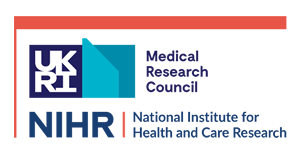Introduction
The Medical Research Council (MRC) - NIHR Efficacy Mechanism Evaluation (EME) Programme plans to hold a call in 2023 for large, ambitious platform studies which efficiently evaluate multiple interventions, with a particular interest in those taking a precision medicine approach. Studies with international collaborations, involving recruitment in other countries to a common protocol, will be particularly welcome where this will benefit the study.
The programme hopes to fund multiple platforms that are able to commence from April 2024. We recognise that developing these complex bids and start-up of the successful platforms will require time and the navigation of additional challenges. Under this present call, applications are therefore invited for work which will accelerate the necessary learning and preparation. It is anticipated that teams may require up to £200,000 over a maximum of 12 months.
These Application Acceleration Awards must include as one of their milestones the production of an application to the planned call, as a key deliverable during the lifetime of the award. It is expected that the work should also contribute to generalisable learning around platform study designs and best practice.
Call scope
Applications to this call must aim to accelerate the development of an application for a precision medicine platform study, within remit of the MRC-NIHR EME Programme.
A precision medicine platform is defined as a study which incorporates the evaluation of more than one intervention or technology within a single protocol, which takes account of interindividual variability when determining eligibility and stratifying participants. At the outset, the platform will be required to evaluate a set number of identified technologies only. However, adaptive designs will be welcomed and applications for further funding to incorporate additional technologies may be subsequently considered.
Applicants should define and justify the specific challenges which will be addressed within this award. Examples of the types of work which may be supported include, but are not limited to:
- Developing networks or collaborations to support the delivery of the platform.
- Understanding and resolving requirements across collaborating countries, including regulatory and governance issues.
- Identifying potential technologies to be evaluated and addressing challenges relating to their inclusion, including commercial engagement.
- Targeted work to clarify the ‘signal of efficacy’ for included technologies. This includes a robust logic for the method of stratification and any test-treatment pairing.
- Further understanding the anticipated effectiveness of the platform study design, including learning from previous platform studies.
- Defining and agreeing a study protocol that may be followed across the collaborating centres.
- Defining and validating elements of the full study design, such as the comparator, sample size or most important health outcome measures.
- Establishing the feasibility of a study in the proposed setting, including Patient and Public Involvement (PPI).
- Where necessary, work to enable rapid start-up of the project (if successfully funded) from April 2024.
Applicants must also articulate what the valuable outputs of the award will be, considering how any generalisable learning around the planning, conduct and effectiveness of platform studies may be disseminated.
International collaboration
The resulting application is expected to be collaborative, and applicants should note that:
- The resulting application must be multi-centre, with the lead institution and Chief Investigator being based in the United Kingdom.
- Collaborations including international recruitment will be particularly welcome where this is beneficial to the study, for example by enabling adequate recruitment in a rare disease or sub-group.
- Generalisability of findings to UK health and healthcare context should be considered and accounted for in the study design.
- The study team may include international co-applicants, where it is justified that the individual will contribute expertise and time to the conduct of the wider study, beyond international recruitment.
- The MRC-NIHR EME Programme is typically not able to provide research costs for international recruitment. Applicants will be required to demonstrate that consideration has been given to the funding of any recruitment outside of the UK.
For more information, please read our International Funding guidance.
Out of scope
- This call is for application development only. Fully developed proposals should be submitted to the Researcher-Led funding opportunity.
- The focus of this call is the development of complex bids involving precision medicine only. Platforms in other areas may be eligible under the planned subsequent call.
- Proposals to add a UK-arm to an existing platform study are not included under this call but may be considered through the Researcher-Led funding opportunity.
Application Acceleration Award process
To enable quicker funding decisions, this is a straight to Stage 2 (single stage) funding opportunity. Successful teams will be expected to start their Application Acceleration Awards by 1 September 2022.
A key deliverable within this award must be the development of a Stage 1 application, submitted to the following call in May 2023. This application may recognise areas of continuing work within the Application Acceleration Award.
Applications progressing to Stage 2 will be submitted in September 2023, with funding decisions expected in November 2023. Successfully funded platform studies should then aim to start from April 2024.


